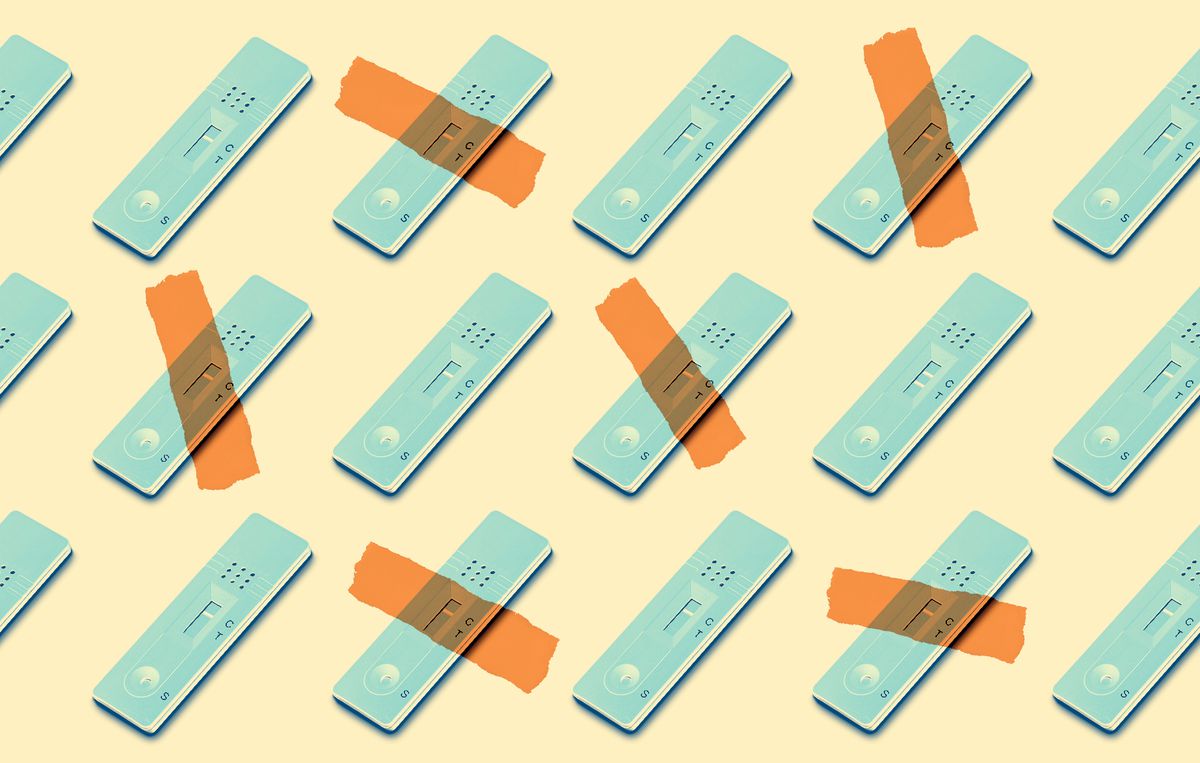

At-home COVID-19 tests aren't nearly as hard to obtain as they were just a few months ago—but with more test availability comes more chances of potentially picking up one that isn't authorized by the Food and Drug Administration.
To that end, the FDA continues to issue recalls for certain at-home COVID-19 tests—the most recent one being SD Biosensor Inc.'s STANDARD Q COVID-19 Ag Home Test. The company issued a voluntary recall of their at-home test on January 31, following reports that the test kits were illegally imported into the US, the FDA said.
Experts warn these recalls are crucial for both personal and public health. "It's critical for one's own personal health to know whether you have COVID or not," Thomas Russo, MD, professor and chief of infectious disease at the University at Buffalo in New York, tells Health. "But it's also critical for others you interact with, because you can potentially infect them. If you're using a test that's flawed for whatever reason, you're not going to be able to get accurate results. It's risky."
The STANDARD Q COVID-19 Ag Home Test is only one of multiple at-home tests that have been recalled lately. Here's what to know about all of the at-home COVID-19 tests that have been recalled—and which ones are deemed safe and effective by the FDA.
Which at-home COVID-19 tests have been recalled?
The Centers for Disease Control and Prevention says COVID-19 tests can generally be divided into two camps: rapid antigen tests, which give you results within a few minutes, and molecular tests, which involve you taking a sample and shipping it to a lab for results. Rapid tests are typically favored by consumers, since they're more convenient.
The following are rapid antigen tests that have been recalled—and for what reasons:
STANDARD Q COVID-19 Ag Home Test
SD Biosensor, Inc., a global in-vitro diagnostics company, voluntarily recalled their STANDARD Q COVID-19 Ag Home Test on January 31. The tests were reportedly illegally imported into the US, which means they aren't FDA-authorized for emergency use. There's no record of the tests being sold directly to consumers, so the company is issuing the recall "out of an abundance of caution," according to the announcement.
CovClear COVID-19 Rapid Antigen Test
In a safety communication issued January 28, the FDA warned people to stop using Empowered Diagnostics' CovClear COVID-19 Rapid Antigen Test, as well as the company's ImmunoPass COVID-19 Neutralizing Antibody Rapid Test. The tests were reportedly labeled as authorized by the FDA though neither had been "authorized, cleared, or approved for distribution or use," the FDA said.
The recall was labelled as a "Class I recall," which is the most serious type of recall, per the FDA—primarily because of the risk of false results when using these unauthorized tests. Though no adverse health consequences or deaths came from use of the tests, the FDA still urged people to dispose of the tests and ask for a refund.
Flowflex SARS-CoV-2 Antigen Rapid Test (Self-Testing)
In a January 9 press release, ACON Laboratories revealed they had issued a recall of the Flowflex SARS-CoV-2 Antigen Rapid Test (Self-Testing), which had been distributed throughout the US, despite being an "unauthorized, adulterated and misbranded counterfeit product." That specific test is only authorized for use in Europe and other markets. The FDA classified the recall as a 'Class II recall," meaning the product could cause "temporary or medically reversible adverse health consequences."
The recall, however, does not affect ACON Laboratories' Flowflex COVID-19 Antigen Home Test, which is authorized for use in the US by the FDA.
Ellume COVID-19 Test
The FDA issued a safety communication on October 6 alerting people of the potential of false-positive results from certain lots of the Ellume COVID-19 Home Test, due to manufacturing issues. Ellume recalled specific lots of the test following the warning, according to a recall alert published by the FDA on November 16.
More than 2.2 million tests had been distributed between April 13, 2021, and August 26, 2021, and there were 35 reports of false positive tests, according to the FDA. It's worth noting that other lots of the Ellume tests were not impacted by the recall.
Which at-home COVID-19 tests are still considered safe to use?
Even after recalls, you may still come into contact with an unauthorized at-home COVID-19 test. To help, the FDA has a list on their website of all at-home tests that have been authorized for emergency use. The following rapid antigen tests are safe to use in the US:
- BinaxNOW COVID-19 Ag Card Home Test
- BinaxNOW COVID-19 Antigen Self Test
- BinaxNOW COVID-19 Ag Card 2 Home Test
- COVID-19 At-Home Test by SD Biosensor, Inc.
- CLINITEST Rapid COVID-19 Antigen Self-Test
- iHealth COVID-19 Antigen Rapid Test
- CareStart COVID-19 Antigen Home Test
- BD Veritor At-Home COVID-19 Test
- SCoV-2 Ag Detect Rapid Self-Test by InBios International, Inc.
- InteliSwab COVID-19 Rapid Test
- Celltrion DiaTrust COVID-19 Ag Home Test
- QuickVue At-Home OTC COVID-19 Test
- Flowflex COVID-19 Antigen Home Test
- InteliSwab COVID-19 Rapid Test Rx
- QuickVue At-Home COVID-19 Test
- Ellume COVID-19 Home Test
These molecular diagnostic tests are also FDA authorized for at-home use:
- Detect Covid-19 Test
- Lucira CHECK-IT COVID-19 Test Kit
- Cue COVID-19 Test for Home and Over The Counter Use
- Lucira COVID-19 All-In-One Test Kit
According to the Federal Trade Commission (FTC), there are a few additional ways to make sure your at-home COVID-19 test is legitimate, like scoping out the seller before you purchase a test (it's best to purchase tests from trusted sources, like pharmacies and retail chains). If you do decide to purchase an at-home test online, it's important to look at online reviews to make sure the seller is trustworthy.
And if you're worried one of your at-home tests has been recalled, check the FDA's online list of recalls and its safety communications webpage. "If anyone is concerned that their test may be affected by a recall, these would be the two places to check," FDA press officer James McKinney tells Health. "Each issue is different, so individuals should check the details of the communication to see if it may affect their test." But again, if you buy your test from a reputable place—or order it directly from the government—you should be able to trust your purchase.
The information in this story is accurate as of press time. However, as the situation surrounding COVID-19 continues to evolve, it's possible that some data have changed since publication. While Health is trying to keep our stories as up-to-date as possible, we also encourage readers to stay informed on news and recommendations for their own communities by using the CDC, WHO, and their local public health department as resources.
Source: Read Full Article
